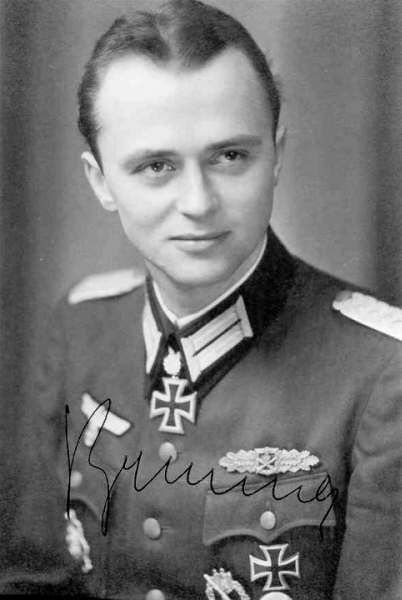Brunner, Eduard
- Date of birth:
- December 8th, 1918 (Munich/Bavaria, Germany)
- Date of death:
- May 13th, 2006 (Munich/Bavaria, Germany)
- Nationality:
- German (1933-1945, Third Reich)
Biography
Was from 1960 till March 31st 1975 in service with the West-German Bundeswehr with as last rank that of Oberstleutnant.
Do you have more information about this person? Inform us!
- Period:
- Second World War (1939-1945)
- Awarded on:
- November 29th, 1939
- Period:
- Second World War (1939-1945)
- Awarded on:
- July 22nd, 1940
- Period:
- Second World War (1939-1945)
- Rank:
- Oberleutnant (Lieutenant)
- Unit:
- 2. / Grenadier-Regiment 62 / 7.Infanterie-Division
- Awarded on:
- March 24th, 1943
Award 337/27.
- Period:
- Second World War (1939-1945)
- Rank:
- Hauptmann (Captain)
- Unit:
- Führer I. / Grenadier-Regiment 62 / 7.Infanterie-Division / XXIII.Armee-Korps / 2.Armee / Heeresgruppe Mitte
- Awarded on:
- February 27th, 1944
Hauptmann Brunner and his men went on to repel 4 attacks against Bessedki on the following night, and the Germans remained in firm control of the village on the next day (the 15.01.1944). However the Soviets were determined to capture Bessedki and use it as a jump-off point to interdict a nearby road/railway link. On the 17.01.1944 alone they attacked the village 6 times in both day and night attacks, but the defenders held firm. On the morning of that day Hauptmann Brunner personally led a counterthrust into the flank of a Soviet attack and ejected the attackers from a housing group that was partially outside of the village.
Hauptmann Brunner would eventually receive the Knight’s Cross for distinguishing himself during both offense and defense around this village.
2720th Award.
- Period:
- Second World War (1939-1945)
- Rank:
- Hauptmann (Captain)
- Unit:
- Kommandeur I. / Grenadier-Regiment 62 / 7.Infanterie-Division / 2.Armee / Heeresgruppe Mitte
- Awarded on:
- October 28th, 1944
The following press excerpt describes why Brunner was awarded the Oakleaves to his Knight’s Cross…
“While serving in the battle area west of Rozan, Hauptmann Brunner conducted two bold counterthrusts against the strongly attacking enemy forces, and by doing so he held a village of decisive importance for the continuation of the combat in the area. In the process a broken-in Soviet battalion and 2 tanks were destroyed. Two days later he once again served as the soul of the resistance during the defense against a renewed Bolshevik onslaught.”
The first of these combat actions took place on the 16.10.1944, and the village referred to was Zakliczewo. On this day the Soviets attacked the village with a 3-1 numerical superiority and managed to take two-thirds of the village in their first attack. Major Brunner led the remnants of his Bataillon as well as a subordinated SPW Kompanie in a counterattack that retook the village. The Soviets then fed in their own reinforcements and threw the Bataillon back, however Brunner and his men then retook the village a second time, this time definitively.
638th Award.
“While serving in the battle area west of Rozan, Hauptmann Brunner conducted two bold counterthrusts against the strongly attacking enemy forces, and by doing so he held a village of decisive importance for the continuation of the combat in the area. In the process a broken-in Soviet battalion and 2 tanks were destroyed. Two days later he once again served as the soul of the resistance during the defense against a renewed Bolshevik onslaught.”
The first of these combat actions took place on the 16.10.1944, and the village referred to was Zakliczewo. On this day the Soviets attacked the village with a 3-1 numerical superiority and managed to take two-thirds of the village in their first attack. Major Brunner led the remnants of his Bataillon as well as a subordinated SPW Kompanie in a counterattack that retook the village. The Soviets then fed in their own reinforcements and threw the Bataillon back, however Brunner and his men then retook the village a second time, this time definitively.
638th Award.
- Period:
- Second World War (1939-1945)
- Period:
- Second World War (1939-1945)
Sources
- Photo 1: Willi Schumacher Collection
- - THOMAS, FRANZ & WEGMANN, GÜNTER, Die Ritterkreuzträger der Deutschen Wehrmacht 1939-1945, Biblio Verlag, Osnabrück, 1993.
- Die Ordensträger der Deutschen Wehrmacht (CD), VMD-Verlag GmbH, Osnabrück, 2002
- Kwasny A., Kwasny G., Die Eichenlaubträger 1940-1945 (CD), Deutsches Wehrkundearchiv, Lage-Waddenhausen, 2001
- Fellgiebel W.P., Elite of the Third Reich, The recipients of the Knight's Cross of the Iron Cross 1939-1945: A Reference, Helion & Company Limited, Solihull, 2003, ISBN 1-874622-46-9
- Patzwall K., Scherzer V., Das Deutsche Kreuz 1941-1945, Geschichte und Inhaber Band II, Verlag Klaus D. Patzwall, Norderstedt, 2001
- Ritterkreuztraeger 1939 - 1945
- Die träger des Ritterkreuzes des Eiserne Kreuz 1939 - 1945










